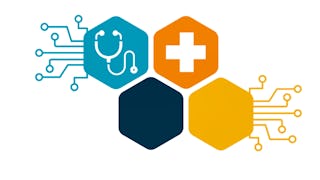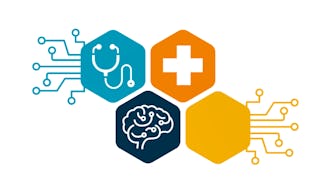AI is reshaping healthcare delivery—from enhancing diagnostics with machine learning to streamlining administrative workflows and optimizing treatment decisions through predictive analytics. This course, AI Innovations with Open Tools in Healthcare Processes, empowers healthcare professionals, AI engineers, and medical researchers to harness open-source frameworks for building scalable, ethical, and interoperable AI solutions.



AI Innovations with Open Tools in Healthcare Processes


Instructors: Starweaver
Access provided by SGCSRC
Recommended experience
What you'll learn
Explain the basics of AI and its practical applications in healthcare.
Build and use AI-assisted tools for diagnosis, documentation, and patient monitoring.
Create nursing reports and care plans using ChatGPT.
Recognize legal, ethical, and safety considerations of using AI in clinical environments
Skills you'll gain
- Healthcare Industry Knowledge
- Artificial Intelligence
- Clinical Informatics
- Medical Coding
- Open Source Technology
- Decision Support Systems
- Data Ethics
- ChatGPT
- Health Technology
- Medical Imaging
- Patient Communication
- Health Care Procedure and Regulation
- Applied Machine Learning
- Health Insurance Portability And Accountability Act (HIPAA) Compliance
- AI Personalization
- General Data Protection Regulation (GDPR)
- Automation
- Health Informatics
- Healthcare Ethics
- Responsible AI
Details to know

Add to your LinkedIn profile
September 2025
See how employees at top companies are mastering in-demand skills

There are 6 modules in this course
In this course, you’ll explore how artificial intelligence is reshaping healthcare by combining open-source tools with real-world clinical workflows. You’ll focus on translating cutting-edge AI into actionable healthcare practices, from diagnostics and treatment optimization to workflow automation and patient care enhancement. Through concise expert-led videos, hands-on demonstrations, and open-source frameworks, you’ll gain the skills to design, deploy, and govern scalable AI healthcare solutions. By the end, you’ll be equipped to overcome fragmented data challenges, ensure ethical and regulatory compliance, and deliver AI-driven processes that improve outcomes, reduce costs, and advance accessible healthcare innovation.
What's included
1 video1 reading1 plugin
In this module, you’ll explore how artificial intelligence is reshaping healthcare practices, systems, and patient care. You’ll examine the fundamentals of AI, how it differs from traditional rule-based systems, and why it has become a vital tool in modern medicine. You’ll analyze real-world applications in imaging, predictive analytics, and administrative workflows, while also addressing common myths and risks associated with AI in clinical environments. Finally, you’ll evaluate AI’s role as a supportive tool that empowers healthcare professionals, enhances efficiency, and safeguards patient outcomes.
What's included
10 videos1 reading1 assignment1 peer review1 discussion prompt
In this module, you’ll explore the ecosystem of open-source AI tools driving innovation in healthcare. You’ll examine the principles and value of open-source frameworks, compare them to proprietary models, and evaluate their role in advancing medical research and clinical adoption. You’ll gain hands-on exposure to real-world applications like ChatGPT, Symptoma, and Glass AI for documentation, triage, and diagnosis. Finally, you’ll practice working with public datasets and no-code platforms such as Teachable Machine, learning to build simple AI models while applying best practices for data privacy and compliance.
What's included
10 videos1 reading1 assignment1 peer review1 discussion prompt
In this module, you’ll explore practical applications of AI across core healthcare processes, from diagnostics and patient monitoring to hospital operations and clinical support. You’ll examine how AI enhances imaging interpretation, supports early disease detection, and integrates with wearable devices for real-time monitoring and predictive care. You’ll analyze how smart assistants, chatbots, and workflow automation improve hospital efficiency while reducing clinician burden. Finally, you’ll gain hands-on experience using ChatGPT to simulate patient conversations, equipping you with tools to enhance documentation, care planning, and patient interaction in clinical practice.
What's included
10 videos1 reading1 assignment1 peer review1 discussion prompt
In this module, you’ll explore how AI-powered Clinical Decision Support Systems (CDSS) enhance real-time clinical decision-making. You’ll examine the structure, types, and benefits of CDSS, comparing knowledge-based and AI-driven approaches in critical care. You’ll also evaluate key safety, legal, and regulatory issues surrounding AI in healthcare, including compliance with HIPAA and GDPR and global governance initiatives. Finally, you’ll assess the ethical challenges of bias, fairness, and explainability, and apply principles of responsible AI deployment to ensure trustworthy, transparent, and equitable use of CDSS in clinical practice.
What's included
10 videos1 reading1 assignment1 peer review1 discussion prompt
In this wrap-up module, you’ll consolidate your learning by reviewing the integration of AI into healthcare processes and reflecting on its impact on clinical practice and operations. Finally, you’ll showcase your ability to translate open-source AI concepts into practical, hands-on healthcare applications, preparing you to implement innovative solutions in real-world settings.
What's included
1 video1 peer review
Instructors


Offered by
Why people choose Coursera for their career




Explore more from Health

Northeastern University

Coursera

University of Colorado System

University of Colorado System
¹ Some assignments in this course are AI-graded. For these assignments, your data will be used in accordance with Coursera's Privacy Notice.

